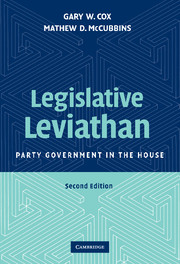Book contents
- Frontmatter
- Contents
- List of Figures
- List of Tables
- Acknowledgments
- Legislative Leviathan
- Introduction
- PART ONE THE AUTONOMY AND DISTINCTIVENESS OF COMMITTEES
- 1 Self-Selection and the Subgovernment Thesis
- 2 The Seniority System in Congress
- 3 Subgovernments and the Representativeness of Committees
- PART TWO A THEORY OF ORGANIZATION
- PART THREE PARTIES AS FLOOR-VOTING COALITIONS
- PART FOUR PARTIES AS PROCEDURAL COALITIONS
- PART FIVE PARTIES AS PROCEDURAL COALITIONS
- Conclusion
- Appendix 1 Uncompensated Seniority Violations, Eightieth through Hundredth Congresses
- Appendix 2 A Model of the Speaker's Scheduling Preferences
- Appendix 3 Unchallengeable and Challengeable Vetoes
- Appendix 4 The Scheduling Power
- Bibliography
- Author Index
- Subject Index
3 - Subgovernments and the Representativeness of Committees
Published online by Cambridge University Press: 05 June 2012
- Frontmatter
- Contents
- List of Figures
- List of Tables
- Acknowledgments
- Legislative Leviathan
- Introduction
- PART ONE THE AUTONOMY AND DISTINCTIVENESS OF COMMITTEES
- 1 Self-Selection and the Subgovernment Thesis
- 2 The Seniority System in Congress
- 3 Subgovernments and the Representativeness of Committees
- PART TWO A THEORY OF ORGANIZATION
- PART THREE PARTIES AS FLOOR-VOTING COALITIONS
- PART FOUR PARTIES AS PROCEDURAL COALITIONS
- PART FIVE PARTIES AS PROCEDURAL COALITIONS
- Conclusion
- Appendix 1 Uncompensated Seniority Violations, Eightieth through Hundredth Congresses
- Appendix 2 A Model of the Speaker's Scheduling Preferences
- Appendix 3 Unchallengeable and Challengeable Vetoes
- Appendix 4 The Scheduling Power
- Bibliography
- Author Index
- Subject Index
Summary
One of the key notions entailed in the committee government model, especially in its more extreme “subgovernment” version, is that many congressional committees are unrepresentative of their parent chambers. It is easy to see why this notion is important: if most committees mirrored the range of interests found on the floor, then the autonomy that they are assumed to possess would have much fewer far-reaching consequences.
The belief that many committees are unrepresentative is partly based on a deduction from the assumptions that members seek assignment to committees pertinent to the interests of their constituents (the interest-seeking hypothesis) and that most assignment requests are routinely accommodated by each party's CC (the accommodation hypothesis). We believe the premises of this deduction to be shaky (see Chapter 2), but unrepresentative committees may arise even if members do not self-select onto committees. Self-selection focuses on the unrepresentative character of those who enter a committee, but it can also be that those who exit are unrepresentative, and either process is sufficient to produce unrepresentative panels. If we accept the possibility that subgovernments may arise whenever there are unrepresentative committees (unrepresentativeness + autonomy = subgovernment), then committee unrepresentativeness itself is of interest to those who would assess the plausibility of the view that Congress is something like a giant logroll among subgovernments.
The view that a system of reciprocity exists among autonomous committees, who trade support on the floor (or “defer” to one another's policy-area expertise), seems to require a certain number of unrepresentative committees.
- Type
- Chapter
- Information
- Legislative LeviathanParty Government in the House, pp. 58 - 76Publisher: Cambridge University PressPrint publication year: 2007



